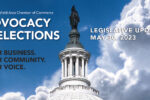2019 Legislative Report – Week 12
[The following is an excerpt from the Oregon State Chamber of Commerce’s (OSCC) Legislative Report. Any opinions expressed or implied are those of OSCC and do not necessarily reflect those of the Springfield Chamber or its representatives. A link to the complete update can be found at the bottom of this article.]
What’s Happening (OSCC Political Observations)
The second half of the 2019 session is now underway.
Legislative leadership has made the timing decision to prioritize the $2 billion business Commercial Activity Tax (HB 2019) and put it at the front of the line. We are expecting quick consideration of HB 2019 with public hearings on the new tax as early as this week.
This means that Cap & Trade (HB 2020) has been postponed until after consideration of the business tax hike. This could push Cap & Trade back by a month or more as it is currently mired in complexity primarily from the transportation sector.
The major focus of the legislature this week will be passing bills during numerous floor sessions so that they can move bills to the second chamber in a timely way. Committee activity will be greatly diminished this week as both the House and Senate will be focused on casting floor votes this week.
Activity on Major Issues
The major issue that will be moving forward this week in the Joint Student Success Committee is the $2 billion Commercial Activity Tax (HB 2020), which was finally unveiled last week. Also of note, the Governor unveiled her PERS liability buy-down proposal last week along with a PERS reform proposal that would require Tier 1 and Tier 2 active employees to contribute 3% of pay down the unfunded liability of the state’s pension program.
• Commercial Activity Tax. At a high level, the gross receipts tax proposal includes the following components:
• A flat $250 tax if business sales are under $1 million;
• A commercial activity tax (CAT) rate of 0.49% on Oregon sales over $1 million;
• A 25% deduction from taxable sales for labor OR business inputs, whichever is higher;
• An exemption for receipts from sales to a wholesaler or ag cooperative for any sales outside of Oregon; and
• An exemption for groceries (defined as those that qualify for ‘SNAP’).
This proposal is likely to change over the next week, and OSCC will keep chambers apprised of any changes to the tax reform package. In the meantime, the business community continues to oppose a commercial activity tax.
• PERS Raids and Reform. On Friday afternoon, Governor Brown unveiled her plan to halt the rise of PERS costs for Oregon’s schools by sweeping $486 million in reserves held by SAIF Corp, the state-owned worker’s compensation insurer. She also proposed taking $400 to $500 million in kicker payments to pay down K-12 PERS liability, but that move would take a 2/3 vote by each chamber of the legislature. OSCC is closely tracking these efforts, and business groups are mobilizing against the threat of sweeping SAIF reserves.
The one piece of PERS reform proposed by the Governor is to institute pension contributions from public employees. The governor’s plan calls for active Tier 1 and 2 members of PERS – those hired before August 2003 and still working – to contribute 3 percent of their pay to an account that would help pay for their pension benefits. Employees’ first $20,000 in salary would be exempt from the contribution. Those hired after that date would contribute 1.5 percent of their pay after exempting the first $20,000 in salary.
Those changes could bring in about $100 million per biennium.
What happened last week?
Paid Family & Medical Leave. (HB 3031; HB 2005) After the April 9 deadline, only one paid family and medical leave vehicle remains, HB 2005. HB 2005 gives the Employment Department the authority to levy up to a 1% payroll tax on employers and a 1% income tax on employees to implement a 26-week per year paid family leave program. The bill would apply to all employers with at least one employee and raise $1.5 billion in new taxes every biennium.
Bounty Hunter Law. (SB 750) OSCC joined other business organizations in opposition to SB 750, which would allow employees and third party organizations to act as private attorneys general to supplement enforcement actions by public agencies. This would create a wave of costly litigation against Oregon employers.
Pay Equity Technical Fixes. (SB 123) Following BOLI rulemaking in November 2018, OSCC brought forward necessary technical fixes to assist local businesses in complying with the Oregon Equal Pay Act. SB 123 is the vehicle for these fixes. Unfortunately, the negotiated product ran into problems when labor logged opposition on Monday evening. The bill moved to the Senate Rules Committee where conversations will continue.
Sexual Harassment in the Workplace. (SB 726) SB 726, the workforce harassment and discrimination bill, moved out of the Senate Workforce Committee with the -5 amendment. The -5 amendment removed the individual liability and “should have known” standard for third parties, which was a positive change for Oregon employers. After the bill passed, the Committee Chair indicated that a work group would be formed to continue to explore individual liability.
• Pregnancy Accommodations. (HB 2341) After negotiations, HB 2341 was amended to apply new pregnancy accommodation requirements to employers with 6+ employees and allow any employers to file an undue hardship exemption with BOLI.
• Expressing Milk in the Workplace. (HB 2593) Last week, advocates came together to draft – 3 amendments to HB 2593, which allows employers with 10 or fewer employees to file an undue hardship exemption with BOLI if providing unlimited nursing breaks causes significant difficulty or expense.
OSCC appreciates the work of Rep. Shelly Boshart Davis (R-Albany) and Rep. Karin Power (D- Milwaukie) to find middle ground to provide reasonable pregnancy protections in the workplace.
Workers Compensation. (HB 3022) Last week, business interests and the trial lawyers reached a compromise on HB 3022. As a reminder as originally drafted, HB 3022 would undo the Mahonia Hall Reforms that make Oregon’s Worker’s Compensation program one of the best in the country. Conversations will continue on an amendment in the House Rules Committee.
Other Key Issues Coming up This Week.
Marijuana Accommodation. (SB 379) OSCC is still pushing hard to DEFEAT SB 379. SB 379 would undermine and nullify all employers’ workplace drug-free policies and would require employers to accommodate off-duty marijuana use. OSCC is very concerned about the ability of employers to implement and enforce workplace drug-free policies. SB 379 is passed out of Committee on a party line vote but has not been scheduled for a floor vote yet. We suspect we may have defeated this legislation but we do not have official confirmation.
Prevailing wages in Enterprise Zones. (HB 2408) OSCC is turning its attention to HB 2408, which will be scheduled for a House vote this week. HB 2408 requires prevailing wages on private projects valued at $20 million or more in enterprise zones. OSCC will be working with local governments and economic development groups to try and stop this legislation on the House floor.
ACTION ALERT
• OSCC has issued an ACTION ALERT for SB 379 (Marijuana Accommodation). Please respond today! This issue continues to be extraordinarily timely until we get confirmation that the bill is dead.
Discover more from Springfield Bottom Line
Subscribe to get the latest posts sent to your email.





